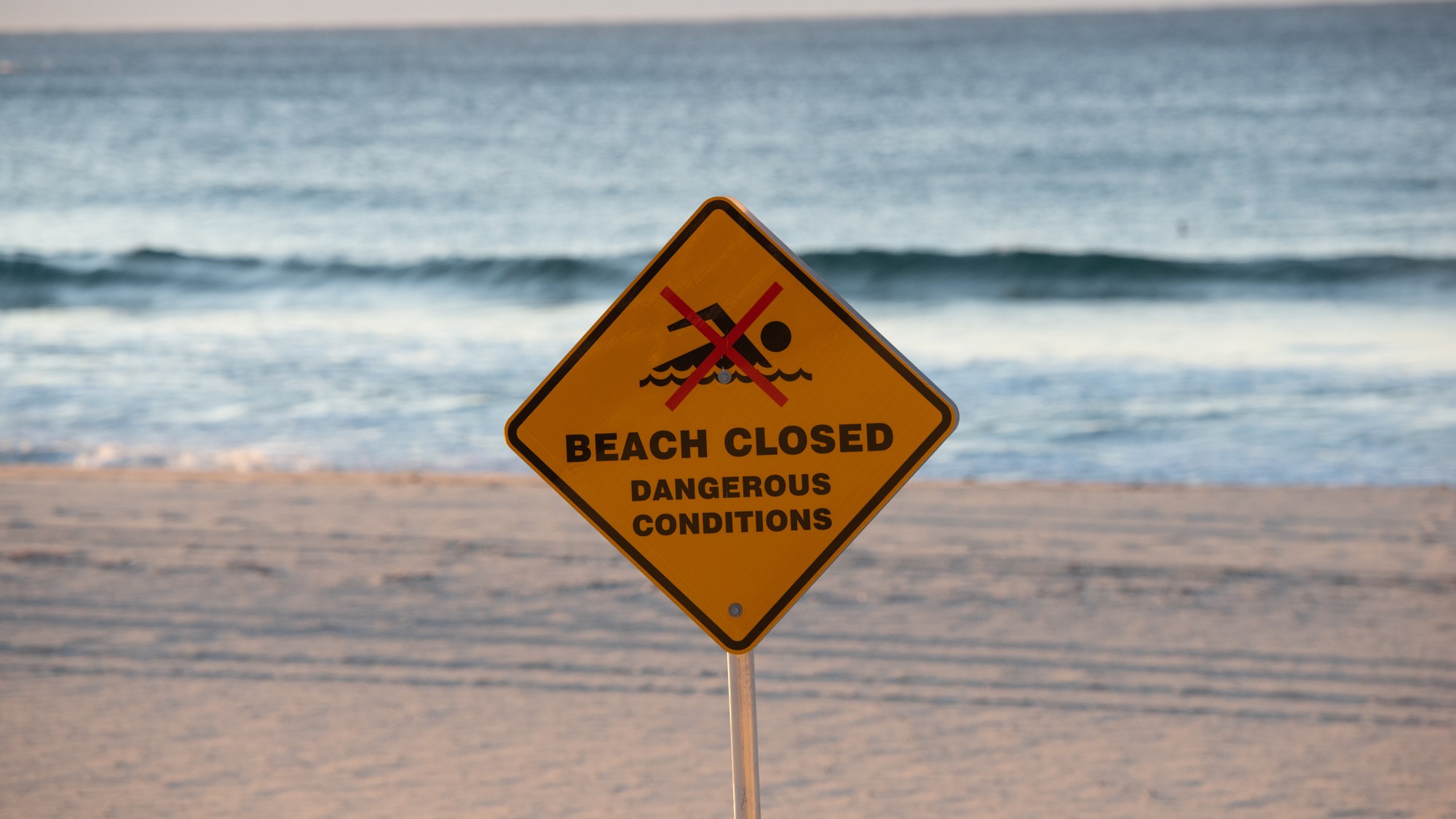Why beaches are closing across the country
Step away from the water!


A free daily email with the biggest news stories of the day – and the best features from TheWeek.com
You are now subscribed
Your newsletter sign-up was successful
Beaches in Massachusetts, California, Michigan, New York and Florida are closing or on the verge of being closed due to unsafe conditions for swimming. Several types of unhealthy bacteria have been found at beaches across the country, plus there is a seeming rise in shark attack risk. Beach closures are likely going to continue as climate change intensifies.
Why are beaches closing?
Swimming in the ocean this summer may be risky, as beaches in several states have closed after being deemed unsafe. "Germs found in the water and sand often come from human or animal feces (poop)," and "one way germs can be carried into swim areas is by heavy rain," said the Centers for Disease Control and Prevention. "Water contaminated with these germs can make you sick if you swallow it."
A handful of beaches in California, Michigan and Massachusetts had enterococci in the water, which "commonly cause urinary tract infections, and can also cause blood infections and endocarditis, an inflammation of the lining of the heart's valves and chambers," said ABC News. Two Massachusetts beaches were found to contain cyanobacteria, which if ingested can cause "symptoms including headaches, stomach pain, dizziness, vomiting and diarrhea," as well as "irritation of the skin, eyes, nose, throat and lungs." Other beaches contained E.coli, which can cause gastrointestinal issues.
The Week
Escape your echo chamber. Get the facts behind the news, plus analysis from multiple perspectives.

Sign up for The Week's Free Newsletters
From our morning news briefing to a weekly Good News Newsletter, get the best of The Week delivered directly to your inbox.
From our morning news briefing to a weekly Good News Newsletter, get the best of The Week delivered directly to your inbox.
Beaches in Florida and California have additionally had an increase in shark sightings and even some attacks that caused closures.
What can be done?
Even beaches that have not been closed can pose a risk. The CDC recommends avoiding bodies of water that look cloudier than usual or have drainage pipes entering into them. It is also recommended to avoid swimming if you are suffering from an illness or have an open cut or wound. "Heavy rains after long periods of drought can pick up animal or human excrement, which can then be carried by runoff into nearby bodies of water, including oceans," said ABC News. "Heavy rains can also cause sewage systems to overflow, causing untreated sewage to likewise contaminate bodies of water."
Climate change may lead to more beach closures in the future. "Bacteria like warmer waters, and climate change is increasing the average temperature of water bodies," said Boston.com. Further, "climate change causes more extreme weather events," which means "when it rains, we get more rain all at once."
Microorganisms are not the only ones who thrive in warmer water. Sharks have also been able to spread out in the warming oceans. "One of the consequences of a changing climate is that it gets warmer further north, so areas that were not habitable to the animal now are," Yannis P. Papastamatiou, an associate professor at Florida International University's Predator Ecology and Conservation lab, said to Newsweek. "So far, the northerly expansion has been seen in juvenile white sharks."
A free daily email with the biggest news stories of the day – and the best features from TheWeek.com
Devika Rao has worked as a staff writer at The Week since 2022, covering science, the environment, climate and business. She previously worked as a policy associate for a nonprofit organization advocating for environmental action from a business perspective.
-
 Health insurance: Premiums soar as ACA subsidies end
Health insurance: Premiums soar as ACA subsidies endFeature 1.4 million people have dropped coverage
-
 Anthropic: AI triggers the ‘SaaSpocalypse’
Anthropic: AI triggers the ‘SaaSpocalypse’Feature A grim reaper for software services?
-
 NIH director Bhattacharya tapped as acting CDC head
NIH director Bhattacharya tapped as acting CDC headSpeed Read Jay Bhattacharya, a critic of the CDC’s Covid-19 response, will now lead the Centers for Disease Control and Prevention
-
 Why broken water companies are failing England and Wales
Why broken water companies are failing England and WalesThe Explainer With rising bills, deteriorating river health and a lack of investment, regulators face an uphill battle to stabilise the industry
-
 The environmental cost of GLP-1s
The environmental cost of GLP-1sThe explainer Producing the drugs is a dirty process
-
 The plan to wall off the ‘Doomsday’ glacier
The plan to wall off the ‘Doomsday’ glacierUnder the Radar Massive barrier could ‘slow the rate of ice loss’ from Thwaites Glacier, whose total collapse would have devastating consequences
-
 Can the UK take any more rain?
Can the UK take any more rain?Today’s Big Question An Atlantic jet stream is ‘stuck’ over British skies, leading to ‘biblical’ downpours and more than 40 consecutive days of rain in some areas
-
 As temperatures rise, US incomes fall
As temperatures rise, US incomes fallUnder the radar Elevated temperatures are capable of affecting the entire economy
-
 The world is entering an ‘era of water bankruptcy’
The world is entering an ‘era of water bankruptcy’The explainer Water might soon be more valuable than gold
-
 Climate change could lead to a reptile ‘sexpocalypse’
Climate change could lead to a reptile ‘sexpocalypse’Under the radar The gender gap has hit the animal kingdom
-
 The former largest iceberg is turning blue. It’s a bad sign.
The former largest iceberg is turning blue. It’s a bad sign.Under the radar It is quickly melting away
